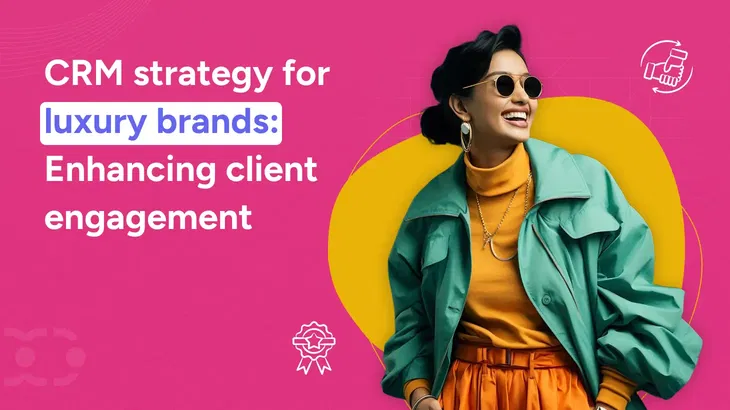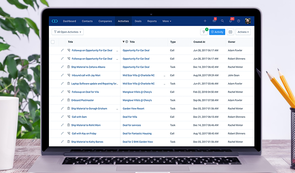Picture this!
A high-profile client walks into the flagship store, expecting the same familiarity and exclusivity they always receive.
But what happens when they visit the brand's website or mobile app? Does the experience feel just as personalized?
For years, luxury brands have perfected the art of in-person clienteling, but many still struggle to replicate that same high-touch experience in the digital world.
With a high-profile consumer base shopping online, luxury retailers need a sophisticated CRM strategy to bridge the gap, ensuring every in-store or email interaction feels more tailored.
Let's explore how CRM is redefining client engagement for luxury brands in today's landscape.
First, let's understand the importance of a CRM strategy for luxury brands.
Understanding the unique needs of your luxury clients
84% of companies consider themselves 'successful' or 'somewhat successful' using CRM software. This success is amplified in the luxury sector when businesses leverage CRM automation to enhance client experiences.
Unlike mass-market shoppers, luxury clients don't just buy products. They invest in exclusivity, personalized experiences, and exceptional service.
Here's what makes them unique and how brands can tailor their approach using CRM:
- Desire for exclusivity: Luxury buyers seek products and experiences that are rare, bespoke, or limited edition. A perfect CRM strategy using tools like Salesmate can track purchase history and preferences to offer personalized recommendations that make clients feel valued.
- High expectations for service: From private styling sessions to seamless concierge services, luxury customers expect exceptional, white-glove service. AI-powered CRM tools can help brands anticipate their needs, ensuring every interaction feels curated and effortless.
- Emphasis on personal relationships: Unlike mass retail, luxury brands thrive on long-term client relationships rather than one-time sales. Sales associates should use CRM data to remember preferences, milestones, and past purchases, fostering deeper brand loyalty.
- Emotional connection & brand storytelling: Luxury purchases are driven by more than just quality. They are about status, craftsmanship, and legacy. CRM insights can help brands craft personalized narratives, making each client feel like part of an exclusive club.
11 Key features and strategies to implement effective CRM for luxury clients
CRM for luxury brands enables the personalization of client experiences through various features and strategies. Here are 11 key features for luxury clients for better CRM implementation and higher sales:
1) AI-powered client profiles
Luxury product shoppers expect a highly personalized experience from brands, both in-store and online.
That's why CRM technology is crucial in meeting those expectations by enabling brands to build: AI-powered client profiles that help in maintaining comprehensive digital records of each customer's preferences.
A well-customized CRM strategy ensures that sales reps worldwide can access a 360-degree view of the customer from a single interface.
Whether customers shop in Paris, New York, or online, their experience remains personalized.
Also, by leveraging AI, brands can automate customer insights, provide real-time product recommendations, and predict future purchasing behaviors that can result in strengthening customer relationships.
An effective CRM strategy focuses on data-driven personalization while preserving the exclusivity that defines luxury brands.
2) Loyalty rewards program
Exclusive loyalty programs in luxury retail go beyond traditional discount-based rewards. Affluent shoppers expect more than just transactional benefits. They seek experiences and prestige.
Instead of redeeming points for price reductions, luxury brands should focus on offering VIP privileges, bespoke gifts, and access to limited-edition collections.
This approach enhances customer satisfaction and reinforces the brand's exclusivity.
A well-structured, tiered loyalty system strengthens the sense of status and exclusivity. By customer segmentation into different tiers based on their engagement and purchase history, luxury retailers can offer progressively elevated benefits.
Integrating a high-end luxury CRM enhances the effectiveness of luxury loyalty programs. A robust CRM system seamlessly tracks customer journey points and determines reward eligibility.
For retailers, the CRM in luxury enables real-time loyalty messaging, helping brands engage customers at the right moments with personalized offers.
3) Personalized marketing campaigns
72% of users said that personalization is highly important for businesses.
Hyper-personalized marketing is critical to a luxury brand's CRM strategy, ensuring every customer interaction feels exclusive and tailored.
Luxury shoppers expect more than generic marketing messages. They seek content and offers that align with their unique preferences and lifestyles.
The CRM system empowers luxury brands with advanced customer segmentation, allowing them to group clients based on demographics, purchasing behavior, and more details.
Such personalized customer segmentation enables retailers to craft highly targeted marketing campaigns through email, SMS, or digital ads, ensuring messages resonate with the right audience.
4) Direct messaging
Real-time direct messaging is a game-changer for luxury brands, offering instant, high-touch communication between retailers and their most valued clients.
Luxury shoppers expect convenience, exclusivity, and immediate access to products and services.
Unlike mass-market consumers, they know exactly what they want and expect seamless service, whether online or in-store.
Direct messaging in CRM systems enables brands to provide this elevated level of service by facilitating instant, one-on-one interactions between sales associates and high-net-worth clients.
By integrating instant messaging within CRM, luxury retailers can ensure that every request is handled efficiently, creating a frictionless experience where products are ready for pickup when the customer arrives.
Salesmate: A perfect CRM for luxury brands!
Salesmate can be an upgrading partner for your high-end luxury CRM, delivering all the expected services for your business through its automation and AI-driven features:
- Contact management: Get a comprehensive, 360-degree view of every contact to personalize your campaigns and understand your leads and clients deeply.
- Sequences: Automate your communication at every stage to stay consistent and keep prospects engaged, driving them closer to conversion.
- Team inbox: A unified team inbox boosts collaboration and efficiency, ensuring that everyone is on the same page and that customer needs are addressed swiftly.
- Sales pipeline management: Get a bird's-eye view of your deals, from prospecting to closing, so you can identify opportunities and bottlenecks for better decision-making.
- Sandy AI: With Sandy’s insights and guidance, your team will enhance productivity and make more data-driven decisions, taking sales efforts to the next level.
- Marketing automation: Manage the entire journey from lead generation to converting prospects into loyal customers with ease.
- Reporting: Gain real-time insights and detailed analytics, empowering you to make informed decisions and track performance more effectively.
Wrap up!
The luxury market is not just about premium products, but it's about experience, exclusivity, and lasting customer relationships.
In today's digital landscape and competitive luxury space, a well-executed CRM strategy is the key to delivering personalized, seamless, data-driven luxury experiences.
From hyper-personalized marketing and direct client engagement to AI-powered insights and optimized supply chain solutions CRM can help with every strategy implementation.
Additionally, CRM also enables luxury brands to anticipate customer needs, enhance loyalty, and streamline operations without compromising exclusivity.
As the luxury industry evolves, brands embracing CRM innovation will enhance customer satisfaction and future-proof their business.







Key takeaways
Picture this!
A high-profile client walks into the flagship store, expecting the same familiarity and exclusivity they always receive.
But what happens when they visit the brand's website or mobile app? Does the experience feel just as personalized?
For years, luxury brands have perfected the art of in-person clienteling, but many still struggle to replicate that same high-touch experience in the digital world.
With a high-profile consumer base shopping online, luxury retailers need a sophisticated CRM strategy to bridge the gap, ensuring every in-store or email interaction feels more tailored.
Let's explore how CRM is redefining client engagement for luxury brands in today's landscape.
First, let's understand the importance of a CRM strategy for luxury brands.
Understanding the unique needs of your luxury clients
84% of companies consider themselves 'successful' or 'somewhat successful' using CRM software. This success is amplified in the luxury sector when businesses leverage CRM automation to enhance client experiences.
Unlike mass-market shoppers, luxury clients don't just buy products. They invest in exclusivity, personalized experiences, and exceptional service.
Here's what makes them unique and how brands can tailor their approach using CRM:
11 Key features and strategies to implement effective CRM for luxury clients
CRM for luxury brands enables the personalization of client experiences through various features and strategies. Here are 11 key features for luxury clients for better CRM implementation and higher sales:
1) AI-powered client profiles
Luxury product shoppers expect a highly personalized experience from brands, both in-store and online.
That's why CRM technology is crucial in meeting those expectations by enabling brands to build: AI-powered client profiles that help in maintaining comprehensive digital records of each customer's preferences.
A well-customized CRM strategy ensures that sales reps worldwide can access a 360-degree view of the customer from a single interface.
Whether customers shop in Paris, New York, or online, their experience remains personalized.
Also, by leveraging AI, brands can automate customer insights, provide real-time product recommendations, and predict future purchasing behaviors that can result in strengthening customer relationships.
An effective CRM strategy focuses on data-driven personalization while preserving the exclusivity that defines luxury brands.
2) Loyalty rewards program
Exclusive loyalty programs in luxury retail go beyond traditional discount-based rewards. Affluent shoppers expect more than just transactional benefits. They seek experiences and prestige.
Instead of redeeming points for price reductions, luxury brands should focus on offering VIP privileges, bespoke gifts, and access to limited-edition collections.
This approach enhances customer satisfaction and reinforces the brand's exclusivity.
A well-structured, tiered loyalty system strengthens the sense of status and exclusivity. By customer segmentation into different tiers based on their engagement and purchase history, luxury retailers can offer progressively elevated benefits.
Integrating a high-end luxury CRM enhances the effectiveness of luxury loyalty programs. A robust CRM system seamlessly tracks customer journey points and determines reward eligibility.
For retailers, the CRM in luxury enables real-time loyalty messaging, helping brands engage customers at the right moments with personalized offers.
3) Personalized marketing campaigns
72% of users said that personalization is highly important for businesses.
Hyper-personalized marketing is critical to a luxury brand's CRM strategy, ensuring every customer interaction feels exclusive and tailored.
Luxury shoppers expect more than generic marketing messages. They seek content and offers that align with their unique preferences and lifestyles.
The CRM system empowers luxury brands with advanced customer segmentation, allowing them to group clients based on demographics, purchasing behavior, and more details.
Such personalized customer segmentation enables retailers to craft highly targeted marketing campaigns through email, SMS, or digital ads, ensuring messages resonate with the right audience.
4) Direct messaging
Real-time direct messaging is a game-changer for luxury brands, offering instant, high-touch communication between retailers and their most valued clients.
Luxury shoppers expect convenience, exclusivity, and immediate access to products and services.
Unlike mass-market consumers, they know exactly what they want and expect seamless service, whether online or in-store.
Direct messaging in CRM systems enables brands to provide this elevated level of service by facilitating instant, one-on-one interactions between sales associates and high-net-worth clients.
By integrating instant messaging within CRM, luxury retailers can ensure that every request is handled efficiently, creating a frictionless experience where products are ready for pickup when the customer arrives.
Salesmate: A perfect CRM for luxury brands!
Salesmate can be an upgrading partner for your high-end luxury CRM, delivering all the expected services for your business through its automation and AI-driven features:
Ready to redefine luxury with a smarter CRM?
With Salesmate, you can streamline customer interactions, automate engagement, and create high-touch experiences
Wrap up!
The luxury market is not just about premium products, but it's about experience, exclusivity, and lasting customer relationships.
In today's digital landscape and competitive luxury space, a well-executed CRM strategy is the key to delivering personalized, seamless, data-driven luxury experiences.
From hyper-personalized marketing and direct client engagement to AI-powered insights and optimized supply chain solutions CRM can help with every strategy implementation.
Additionally, CRM also enables luxury brands to anticipate customer needs, enhance loyalty, and streamline operations without compromising exclusivity.
As the luxury industry evolves, brands embracing CRM innovation will enhance customer satisfaction and future-proof their business.
Frequently asked questions!
1) Why is it important for luxury brands to use a CRM?
A CRM is essential for luxury brands because it enables personalized, high-touch client experiences that align with the expectations of high-net-worth customers.
It helps brands track purchase history, preferences, and interactions, allowing for tailored recommendations, VIP treatment, and seamless omnichannel engagement.
Additionally, CRM systems enhance customer retention, loyalty programs, and exclusive event invitations, ensuring long-term relationships and higher lifetime value.
2) How can luxury brands personalize their CRM approach?
Luxury brands can personalize their CRM approach by leveraging customer data to create tailored experiences. This includes:
Using CRM strategically, luxury brands can elevate customer relationships, enhance brand loyalty, and maintain exclusivity while embracing digital innovation.
3) What are some challenges luxury brands face when implementing CRM systems?
The luxury retail industry faces several challenges when implementing CRM systems, including:
4) Can you provide examples of luxury brands successfully implementing CRM strategies?
There are luxury retail businesses have successfully implemented customer relationship management strategies to enhance customer experiences:
Yasir Ahmad
Content EditorYasir Ahmad is the content editor at Salesmate who adds the finishing touch to the blogs you enjoy, turning CRM talk into stories you’ll actually want to read. He’s all about making complex stuff simple and a little fun too. When he’s not fine-tuning words, you can find him diving into the world of literature, always on the hunt for the next great story.